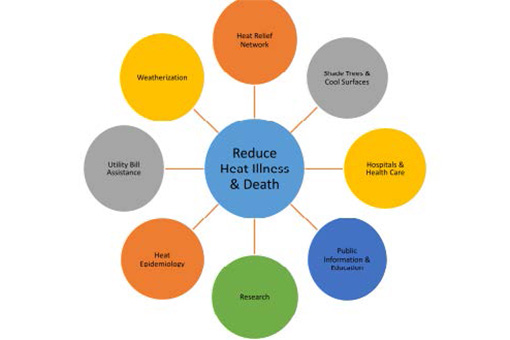Maricopa Coalition on Climate Change and Public Health: Extreme Heat
Organization: Institute for Sustainable Communities
Location: Maricopa & Pinal Counties, Arizona, United States
Country: United States
Other Organizations Involved: Maricopa County (Arizona) Department of Public Health, Maricopa Coalition of Climate Change and Public Health

Background
Maricopa County, Arizona is at the forefront of addressing extreme heat with, on average, 26 days each year with maximum temperatures greater than 43°C (110 °F). A total of 1,292 people have died due to extreme heat since 2006; 182 perished in 2018. Maricopa County Department of Public Health (MCDPH) has been tracking heat-related deaths and illnesses since 2006, refining surveillance protocols, and becoming a global benchmark. But surveilling heat health impacts is only the first step toward preventing them. The Institute for Sustainable Communities (ISC), with partners in Maricopa County, proposes a twelve-month project to support multi-sectoral, multi-disciplinary collaboration to develop a comprehensive process for addressing extreme heat risks to people.
In 2017, MCDPH initiated the Maricopa Coalition on Climate Change and Public Health. Rooted in the CDC’s Building Resilience Against Climate Effects (BRACE) framework, the coalition is designed to increase the community’s capacity to address climate-related health issues. The difficult, formative work of cross-sector coalition-building is complete and the group has developed a Climate and Health Strategic Plan. The highest priority for the coalition is reducing the number of heat-related deaths. With NAPECA’s support, ISC proposes to build the capacity of the Maricopa Coalition to achieve this goal. Leveraging a decade of experience with regional resilience collaboratives, such as the Southeast Florida Regional Climate Change Compact, ISC will lead collective impact processes for reducing heat-related illnesses and deaths.
Goals
This project will benefit nearly 4,600,000 residents experiencing extreme heat in Maricopa and Pinal Counties, across 45 different jurisdictions and tribal communities. The effort aims to support all residents, with interest in highly vulnerable populations most impacted by extreme heat: older adults, children, and low-income communities of color.
Main activities
- Provide facilitation, expert staffing, and technical/strategic advisory services to coalition partners in developing a process charter and standard operating procedures.
- Complete a regional implementation process for addressing extreme heat impacts to heat illness and deaths.
- Organize outreach to key public, nonprofit, and private sector actors to identify, secure and/or align funding across multiple organizational budgets to execute key components of the extreme heat plan.
Results
This proposed project will result in the development of a clear model for a regional extreme heat implementation process that focuses on addressing heat associated health risks. The Institute for Sustainable Communities (ISC) will facilitate the dissemination of results and lessons learned to various networks, including a group of 20 metro-regional climate collaboratives and the Regional Climate Forum. The Maricopa County Department of Public Health will also facilitate the dissemination of results and lessons learned to fellow counties within Arizona.